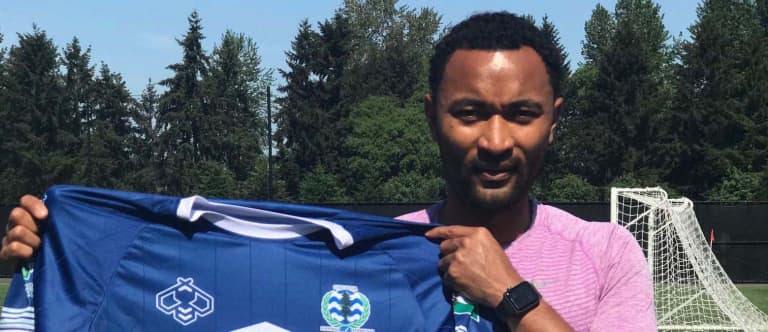At age 35, James Riley—who played with seven different MLS clubs over an expansive, decade-long career—is readying for his first international tournament this summer, though not the one for which the soccer world’s been preparing.
Earlier this year, Riley was recruited to be the captain of the team representing Cascadia at the Confederation of Independent Football Associations (CONIFA) World Football Cup taking place in London from May 31 to June 9. Cascadia will be the first-ever North American entry in the tournament’s history.
The World Football Cup, held every other year since 2014, features teams from what CONIFA’s website declares to be “nations, de-facto nations, regions, minority peoples and sports-isolated territories.”
Riley will lead a squad of 23 players—16 of whom are connected by birth, upbringing, current residence, or family to the Cascadia region that the Seattle Sounders FC, Portland Timbers, Vancouver Whitecaps, and their legendary legions of fans call home.
Cascadia have been drawn into a group with Barawa (a Somali city whose London-based FA is the tournament’s “host"), Ellan Vannin (what the native Manx people call the Isle of Man, located between Great Britain and Ireland), and Tamil Eelam (representing the Tamil people of Sri Lanka). The top two in each group advances to an eight-team playoff, though the bottom two go to their own separate bracket to play for ninth through 16th place.
Because some of Cascadia’s players are currently living in England, the team hasn’t yet been on the same field together, and won’t have their first official practice with coach James Nichols (of England’s Kendal Town Football Club) until the day before the World Football Cup kicks off. In fact, Riley notes that Nichols has been communicating with the team via WhatsApp to initiate plans.
Despite this unconventional approach to preparing a team, Riley’s excited to get on the field with his new teammates and represent the region that’s won two of the last three MLS Cups.
“Everyone’s trying to stay fit on their own, and we’ll connect when we’re there,” Riley said. “We’ll try to have a good showing for Cascadia. For me, it’s a very intriguing opportunity. I know that for me, it will be a very competitive environment. I’m taking it very seriously with my training.”
“I think there will be some fantastic individual players there,” he added. “It’ll be a chance to show well, individually and collectively.”
He notes that most of the players on the Cascadia team, including Vancouver-born former Manchester United U-23 midfielder Joshua Doughty, are much younger, and will be vying to catch the eye of the many scouts expected there—especially those who are currently free agents and could conceivably land with English League One or League Two teams.
Riley, starting his career with the New England Revolution, was part of a team that went to three straight MLS Cups (2005-07), and Riley played most of the team’s heartbreaking ’05 MLS Cup loss to the LA Galaxy. In fact, his 107th-minute clearance led to the Galaxy corner kick producing the game’s lone goal. Conversely, Riley played the entirety of the Revolution’s 2007 U.S. Open Cup Final, helping them win their first-ever trophy.

Former Sounder James Riley will lead Cascadia against some of the world's most far-flung territories. | USA Today Images
“It was huge to have him be part of this,” said Aaron Johnsen, president of the Cascadia Association Football Federation sending the team to London. “Having a player of his caliber, who’s played at the highest levels of MLS at the MLS Cup and U.S. Open Cup, has really added something to the team.”
For Riley, being on Team Cascadia gives him the chance to teach and lead players as part of a post-career spectrum of experiences he’s sought: either in coaching, as an executive, or as a broadcaster. He's recently set out to accumulate experience in all three areas, while building a personal brand encompassing mental training, nutrition, and personal coaching.
Riley was recently able to gain executive experience through two years at MLS headquarters as the league’s director of player relations starting in 2016, an experience he termed as “fantastic,” noting he was grateful to “connect with some very influential people inside and outside of Major League Soccer.”
But this past February, Riley seized upon an opportunity that allowed his new family to settle in the exurbs of Seattle instead of New York City’s hustle-and-bustle, joining the Sounders broadcast team. He’s currently anchoring their pre-game, post-game, and halftime shows, and calls games for the club’s Tacoma-based Seattle Sounders FC 2 USL squad.
He sees being part of the Cascadia squad as deepening his bonds with Seattle and the rest of the region, building on his three years as a Sounder ('09-11).
“I think Cascadia’s put itself on the map with its history in the game,” Riley says, noting the fierce three-team rivalry that even predates MLS, evident in the historic 100th meetup between the Sounders and Timbers earlier this month. “Seattle and its fans took MLS to a different level with fan culture, establishing soccer as a place where soccer could flourish, and then Portland and Vancouver entered the league and amplified that. For me, everyone who knows soccer knows Seattle, Portland, and Vancouver, and so this will just help bring awareness about what Cascadia’s about.”













